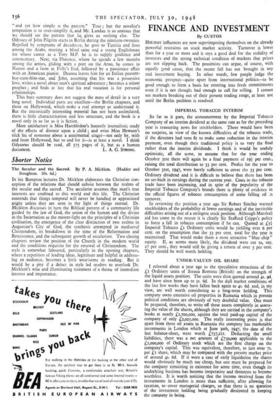Shorter Notice
IN his Bampton lectures Dr. Micklem elaborates the Christian con-. ception of the relations that should subsist between the realms of the secular and the sacred. The secularist assumes that man's true interests are confined to this world and this life. The Christian contends that things temporal will never be handled or appreciated aright unless they are seen in the light of things eternal. Dr. Micklem discusses in' turn the Biblical pattern of a community life guided by the law of God, the union of the human and the divine in the Incarnation as the master-light on the principles of a Christian civilisation, the emergence of the clear distinction of two realms in Augustine's City of God, the synthesis attempted in mediaeval Christendom, its breakdown in the time of the Reformation and Renaissance, and the subsequent growth of secularism. Two closing chapters review the position of the Church in the modern world and the conditions requisite for the renewal of Christendom. The style is somewhat laboured, particularly in the opening chapters, where a repetition of leading ideas, legitimate and helpful in address- ing an audience, becomes a little wearisome in reading. But it would be a pity if a defect in style led readers to overlook Dr. Micklem's wise and illuminating treatment of a theme of immediate interest and importance.


































 Previous page
Previous page